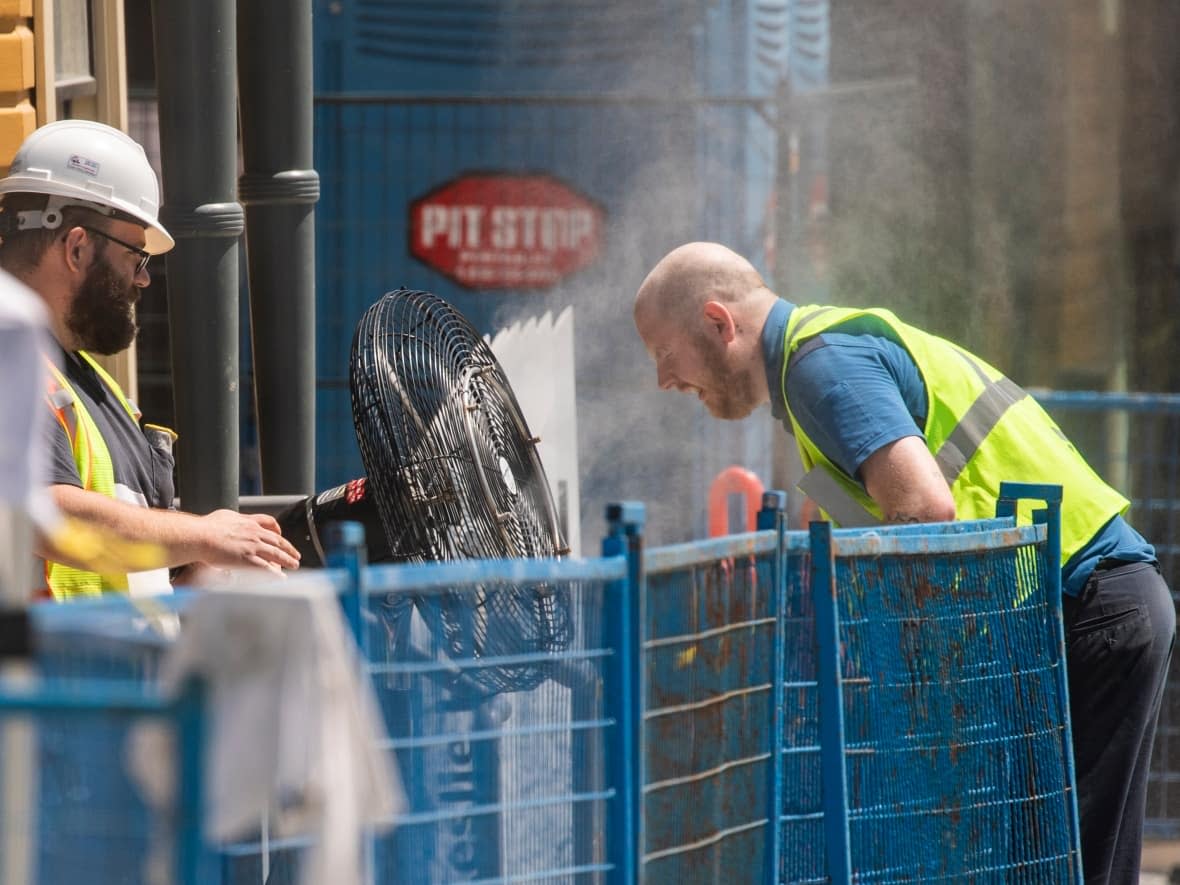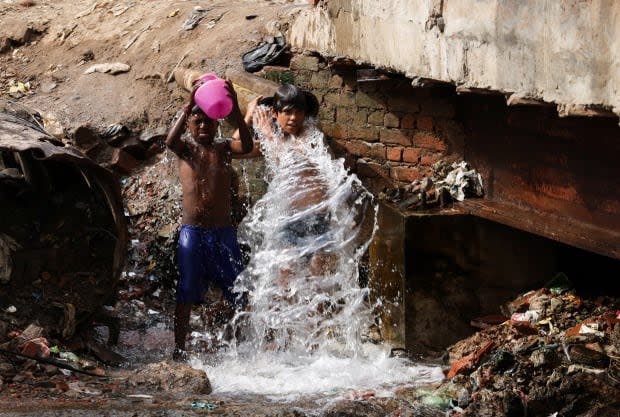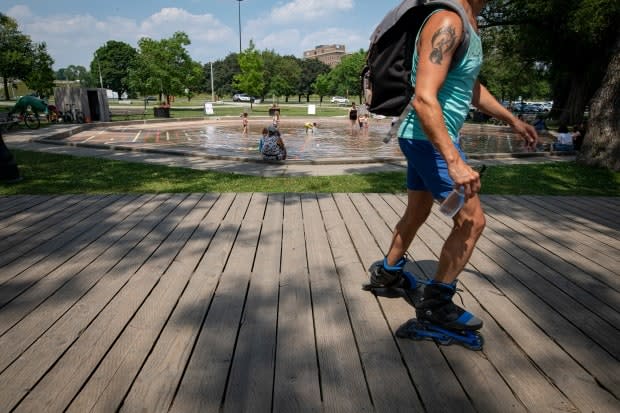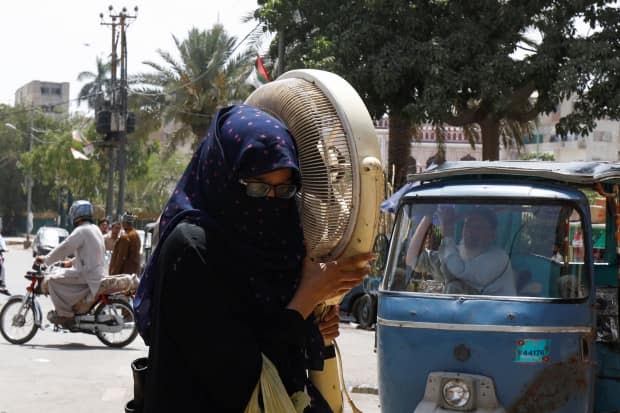Scientists warn future temperatures will test humans' ability to survive

Unbearably hot temperatures are already testing the limits of human survival, and will continue to rise, challenging our bodies' ability to cope and making parts of the world increasingly uninhabitable.
Scientists say urgent steps are needed for humans to adapt to extreme heat, including rethinking the way we live, work and blast the AC.
"Extreme heat is going to get more problematic going forward, period," said Professor Blair Feltmate, head of the Intact Centre on Climate Adaptation at the University of Waterloo in Ontario.
India and Pakistan recently saw temperatures soar to 50 C, killing at least 90 people and devastating agricultural harvests. South Asia, along with Africa, Australia and U.S. Gulf States, now face potentially fatal combinations of heat and humidity — conditions that scientists hadn't anticipated until later this century.

Canada is also feeling the effects of extreme heat: in British Columbia last summer, 595 people died from the heat. The village of Lytton, B.C., set a new Canadian heat record (49.6 C) on June 29, before it was razed by a wildfire the next day. The same "heat dome" left the ground parched, contributing to catastrophic flooding in B.C. months later.
Feltmate is one of the authors of a recent report warning of a "potentially lethal future" for Canadians in terms of heat, especially those living in B.C.'s southern interior, along the U.S. border in the Prairies and in southern Ontario and Quebec.
"We're going to see extreme heat events that will make what we saw in British Columbia last year during the heat dome look relatively mild," Feltmate said.
How heat affects our bodies
When you're exposed to prolonged heat, you may feel sluggish because your organs are working harder to keep you cool — and alive.
Your heart beats harder to push blood to your skin, where it can cool down. Sweating is also essential for cooling your body, but it gets harder as humidity increases.
In extreme cases of heat stroke, your body essentially begins to cook, breaking down cells and causing organ damage.

"It is very much like cooking an egg," said Professor Stephen Cheung, an expert in environmental stress on human physiology at Brock University in St. Catharines, Ont.
"The reason it goes from a liquid to solid white mass is because the proteins have changed … If your body just continues heating up and isn't able to control its temperature, eventually your proteins are going to be doing the same thing in your cells."
Sitting in the shade and drinking water isn't enough when you're already suffering heat stroke. "It is critical to cool [an overheating person] down as rapidly as possible, ideally by immersing them in as cold water as possible," Cheung said.
Being too hot at bedtime also makes it hard for us to sleep, which can lead to poor decision-making and injuries, and have a detrimental impact on people's mental health, says Michael Brauer, a professor at the University of British Columbia's school of population and public health.

"Nighttime temperatures matter a lot. It's really trying to get your bedroom cool enough, get your body cool enough that you can sleep."
Beating the heat
For anyone assuming they can train their body to handle rising heat, Cheung — who helped Canadian athletes prepare for the heat and humidity at last year's Tokyo Olympics — says it is possible to a degree. Our bodies' core temperatures can adjust to higher heat over a period of about two weeks of gradual, continued exposure.
But "in terms of global warming, it is a Band-Aid solution."
"The biggest advantage, in a sense, that humans have over other animals is our behaviour — that we can develop things like housing, air conditioning, better clothing, et cetera," said Cheung. "But that comes at a cost, whether it's keeping us indoors, whether it's increasing power use from air conditioning."
Many people are unable to stay inside and keep cool, including those whose jobs involve physical exertion outdoors, such as farmers and people in manual labour.

In future, Feltmate says, the workday will have to shift so those workers can avoid the hottest part of the day — for instance, by starting work at 5.30 a.m. and finishing by 1 p.m.
Cities themselves need to be cooled, and that involves designing and retrofitting buildings with heat in mind, planting more trees and painting rooftops white to reflect light instead of absorbing it, says Feltmate.
He also says it's critical that residential buildings have a backup power supply to ensure air conditioning and fans keep working if there's a heat-induced blackout.
A lack of urgency
As straightforward as those measures may sound, Feltmate says Canadian cities and governments aren't moving nearly fast enough, despite warnings of the potential for devastating loss of life from extreme heat.
"What's missing in the equation, more than anything, is a lack of a sense of appreciation for the need to act with urgency to put adaptation measures in place."

Adapting also means coming up with a plan for when places actually become too hot for human liveability, as is expected to be the case in parts of the Persian Gulf, South Asia, Central America and West Africa before the end of the century.
"There are true thresholds our bodies can take even when you're acclimated, and the Gulf region is starting to exceed those thresholds more regularly," said Cascade Tuholske, a researcher at Columbia University's Center for International Earth Science Information Network, whose research focuses on exposure to deadly urban heat.
Poorer countries where people rely on subsistence farming could see mass migration to cities, which themselves are ill-equipped to cope with increasing heat.
This is why global solutions to climate change are so important, Tuholske said.
"I do really question the liveability of many of the most populated places on the planet due to extreme heat without adaptation. The future really depends on the present and how much we mitigate heat now."

 Yahoo Movies
Yahoo Movies 
